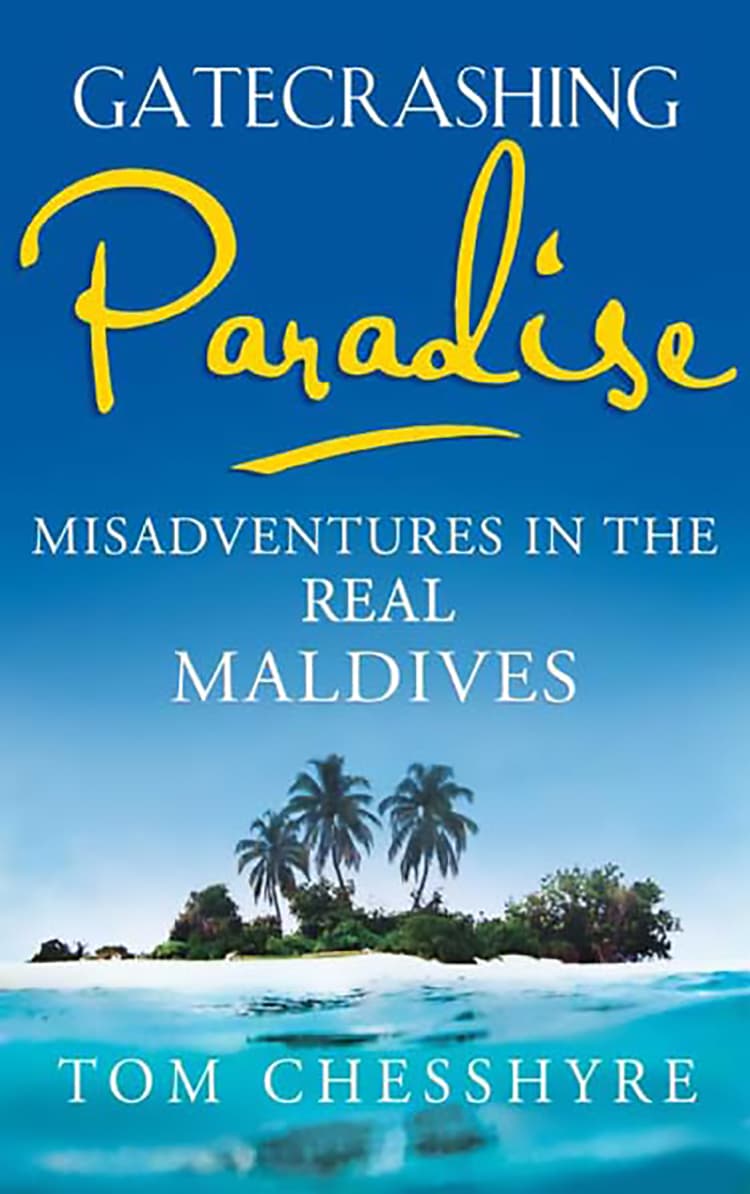From the TS Editors:
Rejoice, intrepid travelers in search of adventure! Your new hero is Tom Chesshyre, a British author whose latest tome, Gatecrashing Paradise: Misadventures in the Real Maldives, goes behind the scenes of the luxury tourism trade to discover what many visitors to similar island paradises never learn but always wonder about. Can the islanders be paying the same price as me? The answer of course, no!
Herewith is an excerpt from it. In search of the Maldives’ hidden side, the author heads for Banishment Island, one of the remotest parts of the archipelago.
When the ship carrying the French sailor François Pyrard hit a reef in the Maldives in the middle of the night in 1602, the crew believed their game was up. “We started with the shock, she suddenly struck a third time, and heeled over,” he writes in his account of the terrifying moment. “I leave you to imagine the condition of all on board – what a pitiful spectacle we presented – the cries and lamentations of men who find themselves wrecked at night on a rock in mid-ocean and await a certain death. Some wept and cried with all their might; others took to prayers [or] confessed to each other…”
Thoughts of Pyrard, who obviously lived to tell his tale, were running through my mind as we entered a storm on the way to “Banishment Island”. Members of the crew yanked a blue tarpaulin across the tiny wooden ferry, battened down the hatches and began working the bilge pump. The handful of passengers and I, squeezed between boxes of curry-flavored instant noodles, chocolate cookies and packets of spaghetti, were offered sick bags. Soft Arabic music played sweetly and incongruously over the stereo. Banishment Island – real name Makunudhoo – is one of the most isolated islands in the Maldives, so obscure that it does not even get a passing mention in guidebooks. Over the years it has often been used as a place of banishment, a punishment that is still part of Maldivian law.
We were sailing through some of the most treacherous waters in the northwest of the long, thin archipelago of 1,200 islands that makes up the Maldives, and events had taken a turn for the worse. I was travelling in a giant circle around the Indian Ocean nation by such means, taking advantage of a recent, little-known change in the country’s laws to allow foreigners to visit places that are not among the 100 or so official “tourist resorts”. From the early 1980s to 2009 it was illegal for outsiders independently to visit islands classified as “inhabited” by locals – there was a fear, a hangover from the days of the hippy trail, that decadent western habits would spoil the Islamic way of life.
With that relaxation of rules, however, a whole new country had effectively opened up, offering a new version of 21st-century island hopping – plus an insight into an intriguing way of life deep in the middle of the ocean. Many people, including tens of thousands of honeymooners, may have visited the Maldives but I was hoping to get beneath the surface of the five-star perfection of its glossy holiday brochures … gatecrashing paradise, if you like.
The water grew rougher still. “The weather is very bad. We go to Goidhoo,” said one of the ferry hands. This, I had discovered, was the thing about traveling off the beaten track in the Maldives – you were never quite sure where you would end up next.
Golden light bathed the island. All the ferry passengers and the crew were to stay overnight on Goidhoo in the hope that the sea would be calmer in the morning. The island chief and his associates were smoking Camel cigarettes and chewing on spicy areca nuts (a Maldivian addiction) at the island’s sole café. I was taken to them and they said they had never had a tourist before. The chief told me that the island was mainly agricultural, producing chilies, watermelons, cucumbers, cabbages, papayas and bananas (much of this produce is sold to high end resorts). We passed the time of day for a while, sitting in palm frond shade at a hexagonal table, storm clouds yet to burst.
A spare room was offered overnight (for 200 ruffiya, about $13). The weather was expected to be calm in the morning and I explored the neat allotment-like plots with basketball-sized watermelons and old X-ray scans wobbling on the end of poles to scare away birds. Farmers peacefully tended to their crops. The rain, which eventually came overnight in great torrents, was holding off.
The muezzin woke me at 4 am. By now I was well accustomed to the strangulated cries. They had become, if not exactly comforting, strangely reassuring; dawn was breaking, a new day awaited. And so, via Goidhoo, we eventually reached Banishment Island, threading through a narrow channel between reefs. The island looked as flat as a piece of paper, with a few dusty streets, a mosque and a friend of one of the ferry hands who could put me up in another spare room.
I was soon balancing precariously on the back of his moped as we puttered beyond a silver-trunked tree decorated with pink and blue plastic flowers in the yard of the succinctly named Income Café. His house was aquamarine with sky blue window frames and a zigzag pattern of tinted and clear glass panes. It had a well-brushed sandy yard and was on a corner not far from the lime green and canary yellow Income Grocery Shop. Makunudhooians seem switched on about the bottom line; they also appeared to love vibrant colours. On other islands I stayed at a new breed of cheap but stylish guest houses that have sprung up since the 2009 change in the law concerning overseas visitors.
If Goidhoo was remote, Makunudhoo was almost off the map. I went for a swim on a perfect beach, diving down amid a kaleidoscope of colorful fish and coral. Then I went to a party. On Banishment Island a pre-Ramadan bash was soon in full swing, with great hunks of barbecued fish being consumed amid much joviality at a tiny crossroads next to the bright pink offices of a branch of the Progressive Party of the Maldives.
Music played, fish bones flew and gossip filled the air. It was as far from a Four Seasons as you could get. It was the other side of the Maldives – paradise without the PR spin, but with a good dose of adventure thrown in.
Gatecrashing Paradise: Misadventures in the Real Maldives, published by Nicholas Brealey, is available on Amazon in Kindle format ($9.99) or paperback (approximately $15.00).


